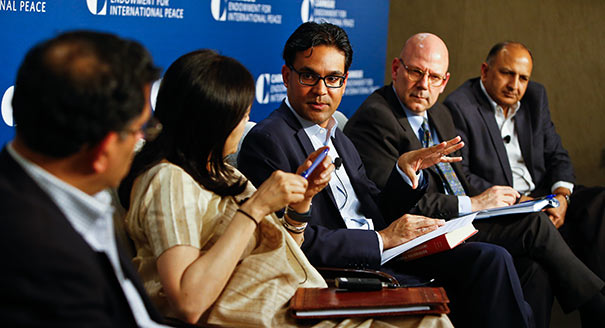Registration
You will receive an email confirming your registration.
While a growing private sector and a vibrant civil society can help compensate for the shortcomings of India’s public sector, the state is—and will remain—indispensable in delivering basic governance. How will India’s public sector navigate the far-reaching transformations the country is experiencing? And what reforms must India carry out to build a reinvigorated state for the twenty-first century?
In a new volume, Rethinking Public Institutions in India, a group of distinguished political and economic thinkers critically assess a diverse array of India’s core federal institutions, from the Supreme Court and Parliament to the Election Commission and the civil services. Drawing on the insights of scholars and practitioners with deep knowledge of the Indian state, co-editors Devesh Kapur and Pratap Bhanu Mehta discussed their findings with Georgetown’s Joel Hellman and the World Bank’s Maitreyi Bordia Das. Carnegie’s Milan Vaishnav, also a co-editor, moderated. A light reception followed.
Maitreyi Bordia Das
Maitreyi Bordia Das is the global lead for social inclusion at the World Bank. She was previously a member of the Indian Administrative Service.
Joel Hellman
Joel Hellman is the dean of the Walsh School of Foreign Service and a distinguished professor in the practice of development at Georgetown University.
Devesh Kapur
Devesh Kapur is the director of the Center for the Advanced Study of India, and a professor of political science and Madan Lal Sobti professor for the study of contemporary India at the University of Pennsylvania.
Pratap Bhanu Mehta
Pratap Bhanu Mehta is the president and chief executive of the Center for Policy Research in New Delhi and a contributing editor at the Indian Express.
Milan Vaishnav
Milan Vaishnav is a senior fellow in the South Asia Program at the Carnegie Endowment for International Peace.
